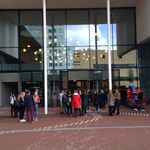In Memoriam Alex Strating
By Milena Veenis
7 February 2024

Alex joined the anthropology department, then housed in the Sarphatistraat, in 1983 as a 27-year-old newly graduated anthropologist. The focus on Europe as a field of study was flourishing and, with his knowledge of both Eastern and Western Europe, he strengthened the former section 'Euromed' (Europe and the Mediterranean).
For many years, he taught the first-year course Introduction to Cultural Anthropology. Next to that, he also developed courses on the anthropology of Europe, the anthropology of inclusion and exclusion, ethnicity and nationalism, power and identity and political anthropology. He was a gifted teacher and supervisor who guided and inspired innumerable students.
His strength as a teacher was above all to show students how much there is to discover about the small ordinary things that are taken for granted in everyday life: a hand gesture, a glance, body postures, and other practices in support of symbolic boundary marking and processes of inclusion and exclusion. Alex had an unerring eye for the ways in which the subtleties of human behavior implicitly reveal 'conversations' about status and power. Slightly ironically, he sometimes commented on how well we, as anthropologists, could understand how power works, while we often find it difficult to put those insights into practice in everyday life. That irony and the subtle distance it expresses characterize him: when others could get excited, he often reacted soberly and with a no nonsense attitude. A colleague recently very aptly described Alex as 'functionally phlegmatic'.
Functional phlegmatism particularly characterized his work as program director. He was the one to frequently ask 'What problem does this solve?', when a new rule was proposed, or an initiative was taken to develop yet another new policy. He only made his voice heard when he thought that it actually mattered, and he was averse to insights presented as didactically innovative which he was afraid to be based more on theoretical wishful thinking than on insights from educational practice.
Alex was passionate as an ethnographer and anthropologist. In his dissertation, he analyzed the sociocultural cohesion and the merchant mentality passed down over generations in the flower trading village of Rijnsburg (South Holland). It is a classic anthropological study, with special focus on the role of kinship in the continuation of the community's economic structure. In the final years of his academic career, he became involved in research on energy trade - again an economic anthropological topic - through a PhD student he supervised. As a co-author, he contributed to a number of articles on the subject.
Fascinated by the role of power in human interactions, Alex himself was averse to boasting. He was the opposite of pretentious and every bit an anthropologist: deeply relativizing and questioning, instead of asserting or stating, profoundly convinced that the delusion of the day can look different tomorrow and intrigued by colleagues who took themselves and their opinions or views too seriously. He observed with amazement how academia was increasingly captivated by the pursuit of academic success in the form of publications which, he did not fail to emphasize, were only read by a few, while teaching could provide dozens of students with new perspectives or insights. He loved teaching, he loved students and he was committed to keeping the university as free as possible from needless regulations and unnecessary policy interference. He favored a humane scale and never got used to the anonymous atmosphere of the Roeterseiland. He felt at home in the Spinhuis with all of its run-down glory, where students and staff would bump into each other in the corridors and get coffee together and drink it in the Common Room.
I can see him sitting there: on the second floor, in that narrow room with the sloping roof, where under the rafters stood an old easy chair, covered with sheets and surrounded by piles of papers and books. Usually the window was open so he could smoke. As a colleague, he often gave me advice. But I knew him from long before, when he was my first teacher. With him I took the first-year introductory course and later a course on the anthropology of Europe - and with me many others, for many of the department's current staff knew him first as a lecturer. With some, he was also a member of the editorial board of Etnofoor. During editorial meetings, friendships developed that brought us together often outside work too. This is how I got to know him better, and I cherish the memories of those meetings: walking, mushroom hunting, jogging in South Limburg (while the rest of the then editorial team of Etnofoor was enjoying a beer), playing music and singing, making songs for the promotions and inaugurations of fellow friends, playing the guitar and enjoying good food and drink, when we pruned and winterized the garden of a fellow friend.
Alex loved his work, he lived for his family and he loved it when work and private life merged; he preferred to end his working day with colleagues for a beer in Café de Pool or De Engelbewaarder, and later in Kriterion or Café Noir, from where he could easily take the metro to CS after a (few) Weihenstephaners. And when he heard that, almost a year ago now, a music night had been organized in the Common Room, he asked me to alert him the next time that would be the case again. He was determined to be there then, livening things up with his beautiful guitar playing and melancholic vocals. It was not to be.
It is God-awful that he died so young and I will miss him terribly; that calm and steady, firm and solid former teacher, friend and mentor. Our great, lovable Alex.
Milena Veenis
